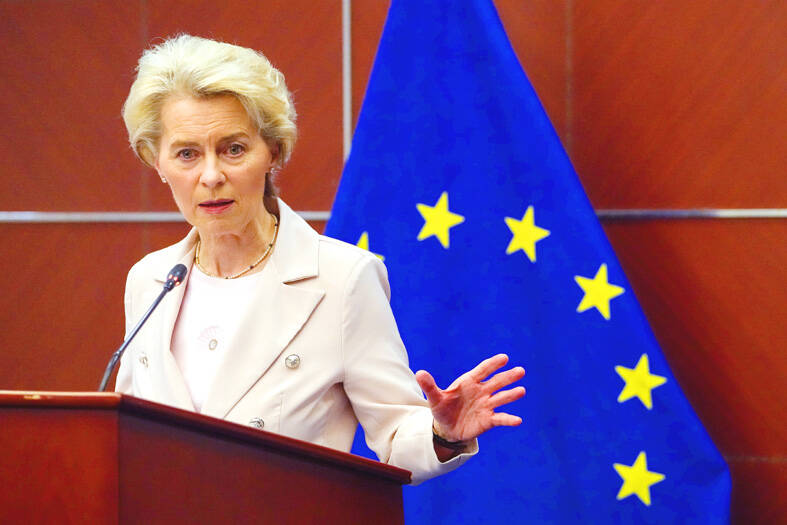Using force to change the “status quo” across the Taiwan Strait would be “unacceptable,” European Commission President Ursula von der Leyen told Chinese President Xi Jinping (習近平) at a meeting in Beijing on Thursday.
“We all agree that stability in the Taiwan Strait is of paramount importance. We have a very clear interest in preserving this stability,” Von der Leyen said.
“The threat of, or the use of, force to change the status quo is unacceptable, and it is important that the tensions that might occur should be resolved through dialogue,” she said.

Photo: AP
Europe has “very clear interests in the [Indo-Pacific] region,” and therefore it has interests in seeing stability maintained in the Taiwan Strait, Von der Leyen said at a news conference following the meeting.
The Ministry of Foreign Affairs in a statement thanked Von der Leyen for raising the issue in her meeting with Xi.
“Countries in the EU have repeatedly expressed support for Taiwan and concern for peace and stability in the Taiwan Strait, echoing similar statements from like-minded nations elsewhere, including the US and Japan,” it said.
“Taiwan will continue to strengthen cooperation with international democratic partners to jointly maintain security and prosperity in the Indo-Pacific region, as well as global freedom and democracy,” it added.
The Chinese Ministry of Foreign Affairs said in a statement that the “Taiwan issue is at the center of China’s core interests. Anyone who expects China to compromise on the Taiwan issue suffers from wishful thinking and will shoot themselves in the foot.”
Chinese state media reports on the meeting omitted Von der Leyen’s comments regarding the use of force.
Chinese news reports said that Von der Leyen “reiterates that the EU has no intention of changing the long-standing one China policy, recognizes the government of the People’s Republic of China as the sole legal government representing the whole of China, and hopes that the Taiwan Strait region will maintain peace and stability.”
Von der Leyen also discussed trade with Xi, saying that the EU’s trade deficit with China of nearly 400 billion euros (US$436.54 billion) is an “unsustainable trend.”
She also said that European companies face unfair competition in China, citing a “buy Chinese” policy that she said discriminates against outside manufacturers of medical equipment.
Companies are also under pressure to transfer technology and face insufficient protection against infringements on intellectual property rights, she said.
While not looking to decouple from China, the European Commission would adopt a “derisking” policy toward the country, she said, adding that trade and competition issues should be resolved through dialogue.
She also raised concerns about human rights in Xinjiang, and encouraged China to make more environmental progress.

The Ministry of Foreign Affairs (MOFA) yesterday said it is closely monitoring developments in Venezuela, and would continue to cooperate with democratic allies and work together for regional and global security, stability, and prosperity. The remarks came after the US on Saturday launched a series of airstrikes in Venezuela and kidnapped Venezuelan President Nicolas Maduro, who was later flown to New York along with his wife. The pair face US charges related to drug trafficking and alleged cooperation with gangs designated as terrorist organizations. Maduro has denied the allegations. The ministry said that it is closely monitoring the political and economic situation

Conflict with Taiwan could leave China with “massive economic disruption, catastrophic military losses, significant social unrest, and devastating sanctions,” a US think tank said in a report released on Monday. The German Marshall Fund released a report titled If China Attacks Taiwan: The Consequences for China of “Minor Conflict” and “Major War” Scenarios. The report details the “massive” economic, military, social and international costs to China in the event of a minor conflict or major war with Taiwan, estimating that the Chinese People’s Liberation Army (PLA) could sustain losses of more than half of its active-duty ground forces, including 100,000 troops. Understanding Chinese

UNRELENTING: China attempted cyberattacks on Taiwan’s critical infrastructure 2.63 million times per day last year, up from 1.23 million in 2023, the NSB said China’s cyberarmy has long engaged in cyberattacks against Taiwan’s critical infrastructure, employing diverse and evolving tactics, the National Security Bureau (NSB) said yesterday, adding that cyberattacks on critical energy infrastructure last year increased 10-fold compared with the previous year. The NSB yesterday released a report titled Analysis on China’s Cyber Threats to Taiwan’s Critical Infrastructure in 2025, outlining the number of cyberattacks, major tactics and hacker groups. Taiwan’s national intelligence community identified a large number of cybersecurity incidents last year, the bureau said in a statement. China’s cyberarmy last year launched an average of 2.63 million intrusion attempts per day targeting Taiwan’s critical

‘SLICING METHOD’: In the event of a blockade, the China Coast Guard would intercept Taiwanese ships while its navy would seek to deter foreign intervention China’s military drills around Taiwan this week signaled potential strategies to cut the nation off from energy supplies and foreign military assistance, a US think tank report said. The Chinese People’s Liberation Army (PLA) conducted what it called “Justice Mission 2025” exercises from Monday to Tuesday in five maritime zones and airspace around Taiwan, calling them a warning to “Taiwanese independence” forces. In a report released on Wednesday, the Institute for the Study of War said the exercises effectively simulated blocking shipping routes to major port cities, including Kaohsiung, Keelung and Hualien. Taiwan would be highly vulnerable under such a blockade, because it